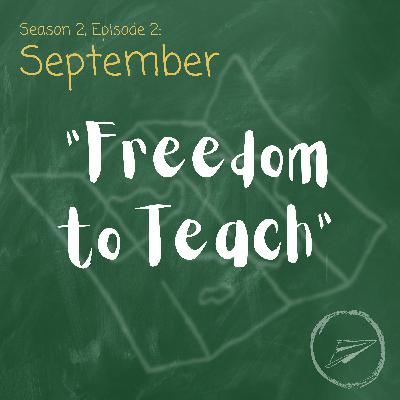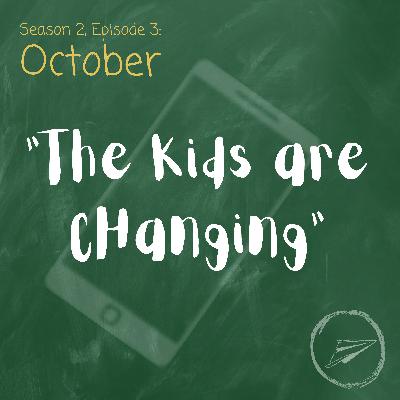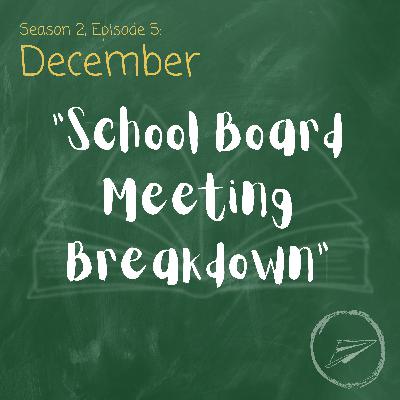6: Those Who Stay
Description
The first step to solving the problem of teacher attrition is to admit that there is a problem. Some groups have already taken this step, and they are listening to teachers in order to create solutions that will retain teachers. These programs make a big difference, but their approach isn’t the norm. In this episode, we hear about successful efforts to keep teachers in education, and we’ll ask the question: Who should have the responsibility of keeping teachers in education?
Music:
Theme Song By Julian Saporiti
“Sunlight” by Nul Tiel Records is licensed under a CC BY-NC-SA license.
“I’m Fat” by Blanket Music is licensed under a CC BY-NC license.
“Keep The Prices Down” by Blanket Music is licensed under a CC BY-NC license.
“Kaptan Hayvanlar Alemi” by Hayvanlar Alemi is licensed under a CC BY-NC-SA license.
“Grab a Bargain” by Scott Holmes Music is licensed under a CC BY license.
“Place on my Bonfire” by Lobo Loco is licensed under a CC BY-NC-SA license.
“Your Paradigm Dial” by Origami Repetika is licensed under a CC BY license.
Transcipt
My third grade teacher had a phone booth in his classroom. It was a full size, glass booth that was mostly sound-proof. The phone booth was the choice place to spend any indoor recess, but during class, it was used as the equivalent of a time-out. Our teacher was a mustachioed man who called his facial hair his “cookie duster” and wore tinted-glasses and thick collared polyester shirts, If a student was misbehaving, he would point that student to the phone booth, and that’s where the student would remain for the rest of the lesson.
Discipline reigned in his class. I’m not sure if this is a quality of 3rd grade teachers in general, but both of the 3rd grade teachers at my school at the time were strict, and my parents loved it. I appreciate some of it now, but at the time I thought it was downright oppressive - especially disciplining groups of kids together, which I’m still not a fan of.
There was a week-stretch in particular where our class lost out on several recesses because a core group of kids were acting out. I don’t remember what they were doing, but I remember the sinking feeling of losing out on the chance to play tetherball or football or to climb on those tractor tires that were half buried in the ground and always had a faint smell of urine. We were stuck indoors.
I complained to my dad about the injustice when he picked me up from school. I ranted about inequity and being punished for something I didn’t do. And I remember his response clearly. He asked me if I was part of the problem or part of the solution. He had to explain what “solution”meant, and then he told me that I needed to think about whether I was helping or hurting the situation.
I realized that even if I wasn’t doing anything wrong, I still might not be part of the solution. Like a whole gaggle of my parents’ other truisms that I didn’t want to hear at the time, this has stuck with me.
We’ve spent the last 5 episodes looking at what factors, what problems, might be contributing to teachers leaving education. Over half of all teachers are considering leaving the profession, but there are teachers who are staying, some of them stay thanks to efforts made by organizations to convince teachers to remain in education. So, today, we’re going to think about solutions that keep brilliant teachers in education, but we’ll also ask the question, whose responsibility is it to keep teachers in education?
This is Those Who Can’t Teach Anymore, a 7-part podcast series exploring why teachers are leaving education and what can be done to stop the exodus. I’m Charles Fournier.
Here is part 6: “Those Who Stay”
Elizabeth Smith: I brought mimosas. I hope you don't mind.
I met Elizabeth on the back patio of the Middle Fork restaurant in Lander, Wyoming. If her voice sounds familiar, it’s because we heard from her earlier in the series.
She wore a blue dress with flower print and she carried a binder and a tote bag. The binder had a copy of her research thesis about retention of teachers on reservations and from the bag she pulled two flute champagne glasses, a jug of orange juice, and a bottle of champagne. Elizabeth is a veteran teacher, she loves teaching, and part of why she loves it might have to do some with her background. As we drank mimosas under the shade of a tree, she told me about her unique upbringing.
Elizabeth Smith: I have a very, very crazy back story. I was raised in a cult. And I dropped out of school in seventh grade. And I never went to high school. And we were raised in a situation in which we didn't have television or outside influence. So I was very isolated and programmed to believe a certain way. And so I got my GED when I was 19, the same year, I got my driver's license, I ran away from home twice, and was successfully out of the house and the religion, the high control, the second time that I left, and so my understanding of educators is completely different.
A quality of early American education that we learned about in the second episode was the idea that teachers would be taught in the education system themselves and so the education hierarchy would be ingrained into them – it was almost a pre-teacher training. Elizabeth didn’t go to public school, so some of these stereotypical expectations aren’t perpetuated in her teaching practice, which might contribute to why she loves it.
Elizabeth Smith: I love what I do. I love teaching, I have high respect for myself, in the work that I do. I know the mistakes that I make, in reflection, for the most part, I'm sure there's some that I'm unaware of, but I enjoy helping people understand themselves, you know, because it's been a huge chore of mine to be able to get to the point where I have undone all the programming that I have experienced in life.
And because of her youth, she was drawn to a sense of spirituality she found in teaching.
Elizabeth Smith: Coming from a really hardcore, high control, religious background. I feel like I suffered spiritual abuse. And so disconnected me from myself, in a lot of ways. And so my whole life, like I told you has been spent trying to figure out who I am. And one of the things in teaching that you'll, especially if you read my research, you'll see that the spiritual connection with making relationships with other people and knowing that what you're doing is valued is a big part of spirituality.
The research Elizabeth points to was tied to her Masters Thesis. She focused on why teachers stay, especially non-native teachers, in reservation schools. What Elizabeth found is that those who stay feel a sense of acceptance, a sense of appreciation that what they bring to a community is valuable. And this is why Elizabeth stays too. She feels like what she does matters. She feels a connection to her students and, for the most part, she feels valued as a teacher.
Elizabeth Smith: I've only taught on reservation schools. So I've only taught in Indian country and there is a cultural perception from Native communities that really value teachers. So that's one of the reasons why non-native teachers decided to stay and have such longevity in reservation country because there is an old school respect for teachers.
I want to be transparent here. Elizabeth isn’t totally satisfied with her job - we’re drinking mimosas because she just finished up the school day and wanted to wind down. During our conversation, Elizabeth pointed out her frustrations, which echo many of the frustrations that we’ve heard in this podcast. She explained situations where she felt devalued or not listened to or stretched thin. She admitted that after teaching for 20 years, the thought of leaving education has crossed her mind, but she said that as long as this year feels like things are getting better, she plans on staying in education.
And this is worth pointing out - even teachers that are staying in education by choice have frustrations. I say by choice because there are the teachers that feel stuck because they are close to retirement, need the insurance, or need the immediate income. Part of what’s keeping Elizabeth, even when she has frustrations, is the fact that she feels like what she does matters and that she feels valued in her community.
Those things might seem small, but we’re at a point where















